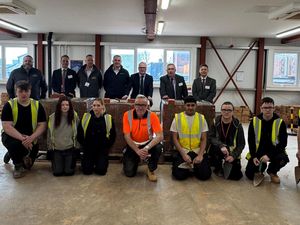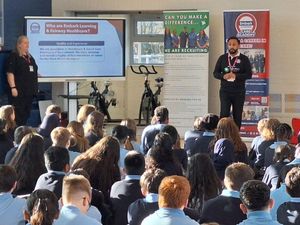A-levels: All you need to know ahead of exam results
It's the day you've been waiting for. For many it will open up opportunities, for others it will spell disappointment. Here, courtesy of the Universities and Colleges Admissions Service is advice to have handy ahead of tomorrow's results day.

Have everything ready:
Results day can be stressful, so make sure you know how it works and what to expect:
Have your sign in details for Ucas handy and update your contact details if you need to.
Make sure you're available on results day, because Ucas can't speak to anyone else about your application details unless you give them nominated access to speak on your behalf.
Check how your exam results get to your universities/colleges – most come directly to Ucas from the awarding organisations, and it sends them on to your choices. But if not, you just send your exam results to your universities or colleges yourself.
What happens:
Hopefully you'll get the exam grades you need, but if you just miss out, don't panic straight away – the university or college might accept you anyway.
You might get a place on either your firm or insurance choice, depending how well your exams go. You might be offered an alternative by the university/college – a 'changed course offer' which you'll need to accept or decline. You might not get a place, but you can search through our Clearing service to see what courses still have vacancies. If no decisions are showing, give your universities or colleges a call to find out more.
Other options:
If you do better than expected then you may want to look at your options. If you had a conditional firm offer you met and exceeded, you might be curious about courses with higher entry requirements. If so, you can see what's available in the Adjustment service offered by Ucas.
If things don't go to plan, find info about exam reviews and appeals – you'll need to try to arrange the review as quickly as possible, and keep in touch with your university or college to keep them up-to-date. Look for course vacancies in the Clearing service offered by Ucas, or look into other options – like a gap year, work or an apprenticeship – either instead of higher education, or just while you reapply for next year.
How does 'clearing' work?
Clearing is how universities and colleges fill any places they still have on their courses. It's an ideal way for you to find another course. You find courses, with vacancies, that interest you, and contact universities or colleges directly, to see if they will offer you a place.
If you haven't already applied, you need to register and make an application, but you’ll only be able to add a choice after you’ve submitted it. Ucas will send you a welcome email, with details of how to access the service and will give you a clearing number. It will also tell you the steps you need to follow – ask for advice, search for vacancies in our search tool, then contact universities and colleges to try to find a place.
Once you have permission from a university you want to go to, you can add the course in the Track system on the Ucas website. You'll know you're in clearing if your Track status says 'You are in clearing' or 'clearing has started'. Or, you follow the on screen prompts to decline your firm place, and your Track status then says ‘You are in clearing’ or ‘clearing has started’.
If Track doesn't say either of these yet, it might just be waiting for your results to update. Get in touch with the universities/colleges if it's taking a while – they might still be considering you, even if your results are a bit lower than required.
Talk to an adviser at your school, college, centre, or careers office – they can talk you through alternative courses/subjects and help you with the clearing service.
Use the search tool on the Ucas website to find courses – it is the only official vacancy list. If you can't find the course you're looking for, then consider different subjects. You don't have to stick with your original idea. You could also look at joint honours courses, so you can study a mix of subjects
Keep checking as universities update their course information regularly. You might not find the exact courses you were looking for – some might be full, but some might get vacancies later on.
Before you add a clearing choice in Track, call the university and give them your clearing number and personal ID, so they can look up your application. Ask if they'd accept you – they might reconsider you, maybe for the same course, even if you applied to them earlier in the year.
It may be worth getting informal offers over the phone – maybe from a variety of universities and colleges – then decide which one you want to accept.
It is also important to ask about accommodation options or to find out if there any on-campus? Take a look around the campus if you have time as it is the best way to see what a university/college is like – most will be happy to meet you and show you around. Alternatively, see if they have a virtual tour.
If you’ve got a place:
Congratulations! Your confirmation letter should appear in the Ucas Track system five to seven days after your place is confirmed. Your letter is not emailed or posted to you.
Make sure you check your confirmation letter carefully – it will say if there's anything else you need to do, or if your university or college will be in touch with further instructions; maybe to provide proof of your qualifications or medical requirements for example.
Other alternatives:
University or college is not the only option. Increasingly A-level students are taking a different path to a career that suits them best and may also bring them in income.
Apprenticeships and traineeships give you the chance to earn while you learn and gain a qualification. They're a good way to gain the skills and experience you need for many careers. Traineeships prepare you for the future world of work. They're tailored to your needs and provide you with the experience to get an apprenticeship or job.
There's also a range of employer-led school leaver programmes available, which offer a direct route into the world of work, and may include obtaining a qualification as part of the programme.
Gap years can give you space to reconsider your options. You can gain lots of lots of skills and amazing experiences on a gap year. They give you time to focus on what you want to do next, and can enhance your CV or higher education application. You may be able to combine a part-time job with studying to boost you grades ahead of a fresh application for a course next year.
Studying in another country can be a real benefit for any student, particularly if you are thinking of a career which has international dimensions. You can either take a whole degree at a uni abroad or include a year overseas as part of your UK degree.
Other options you may want to think about include studying in a different way – either in the UK or abroad – or you may decide you want to go straight into the world of work. Use UCAS' career finder tool to register for personalised alerts for apprenticeships, school leaver programmes, internships, work experience placements and graduate schemes.





